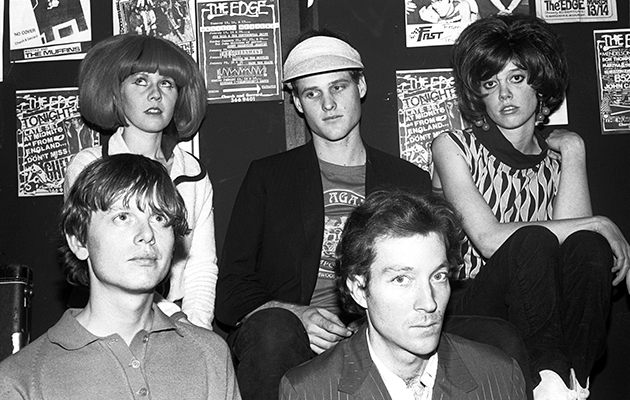1978: an offbeat quintet from Athens, Georgia create an unlikely surf-rock hit. “Yeah, this was the dangerous one... We had to stop shows because plaster was falling from the ceiling!” Originally published in Uncut's May 2015 issue ___________________________ Even in the melting pot of the Am...
STRICKLAND: We went to Stone Mountain Studios, and basically set up live. Maybe we all played it live, so Kate played keyboards and keyboard bass at the same time.
DUNN: I came to produce the first version of “Rock Lobster” through Danny Beard [of DB Records]. He was sort of dating Kate, and was into the band a lot, and he decided that I knew something about recording. In a lot of ways I would always say I was the production chauffeur. I didn’t add very much to the operation, which was pretty bare-boned. It was just like, here’s the sound recorded. The engineer, Bruce Baxter, was a genius in that way, so uh… I directed traffic. That was basically it. I think it took the better part of two days.
SCHNEIDER: I don’t think we added any reverb to the whole recording at all – we didn’t think about it!
DUNN: The aesthetic back then was for dry drums. It was like, do as little to the core of the rhythm section as possible.
STRICKLAND: There wasn’t a lot of production. There were no overdubs. Um, I think we may have overdubbed the gong, though, and kind of pitched it down.
DUNN: I tried, in the “down, down” section, to get a ring modulator effect to be introduced to sound like bubbles. And they were
like, “No.” That notion was not accepted!
SCHNEIDER: We released it in the summer of ’78, and it made its way to Australia and all these different places, and eventually it was one of the best-selling independent singles of that time.
STRICKLAND: A lot of people were very interested in producing us, including Frank Zappa. I love him but I just felt, it’s going to go in that territory, you know – that sort of obvious, very sarcastic humour.
SCHNEIDER: I like British humour, you just come up with something that’s intelligent and ridiculous, and keep a straight face. People were saying, ‘They’re camp’ and shit like that. It’s like, hello, camp means you don’t know what you’re doing, but you’re funny ’cos you’re ridiculous. All our stuff, we knew what we were doing. We were a band with a sense of humour, and a lot of uptight, probably straight, white guys didn’t get it.
STRICKLAND: We liked that our music was more ambiguous, it wasn’t tongue in cheek, because we performed as passionately as someone doing a very heartfelt, gut-wrenching song. It wasn’t like, ‘Here comes the punch line…’
SCHNEIDER: We signed with Warners in 1978. All these different labels kept courting us, ’cos we all figured like, hey, free meals! ’Cos we all had jobs that didn’t pay well – 25 cent tips… Imagine, I’m washing pots and pans one week and flying down to the Bahamas to record our debut album the next. Keith and Ricky were working at the bus station. So it was exciting.
STRICKLAND: We didn’t spend too long recording the first album at Compass Point, maybe a couple of weeks. We recorded pretty quickly once we found a deal ’cos we just wanted to get the album out that summer. So I think we were down there for maybe two weeks. Things went pretty quickly, most of it was recorded live as well.
SCHNEIDER: Chris Blackwell wasn’t really hands-on at all. Robert Ash basically produced the record and I think Chris just listened to it, and made some suggestions.
STRICKLAND: I remember after we finished the album, we listened back to it and I just thought, ‘This sounds horrible.’ I just thought it was dreadful, the whole thing, the whole album… it was terrible. Because I just thought, you know, you go into a studio and you think you’ll sound bigger and better or whatever, you know? And Chris really wanted to keep it stripped down and just sound the way we did it. I mean to me, to my ears, we never sounded that way. In the club, it’s reverby, the acoustics are horrible and so there’s a lot of splashing around with sounds, it always sounded much bigger to me when we played live. And it was louder and bigger, but in the recording it doesn’t sound that way, it sounds very stripped down and very minimal.



